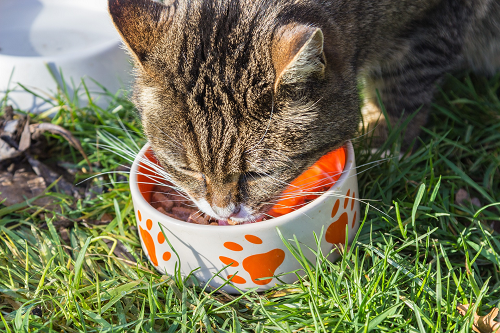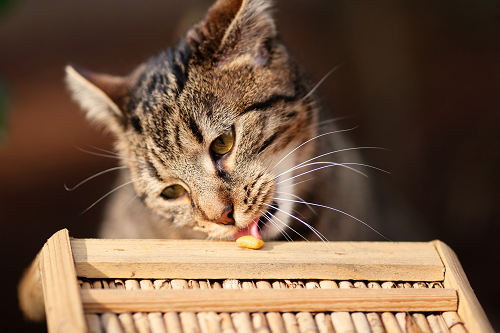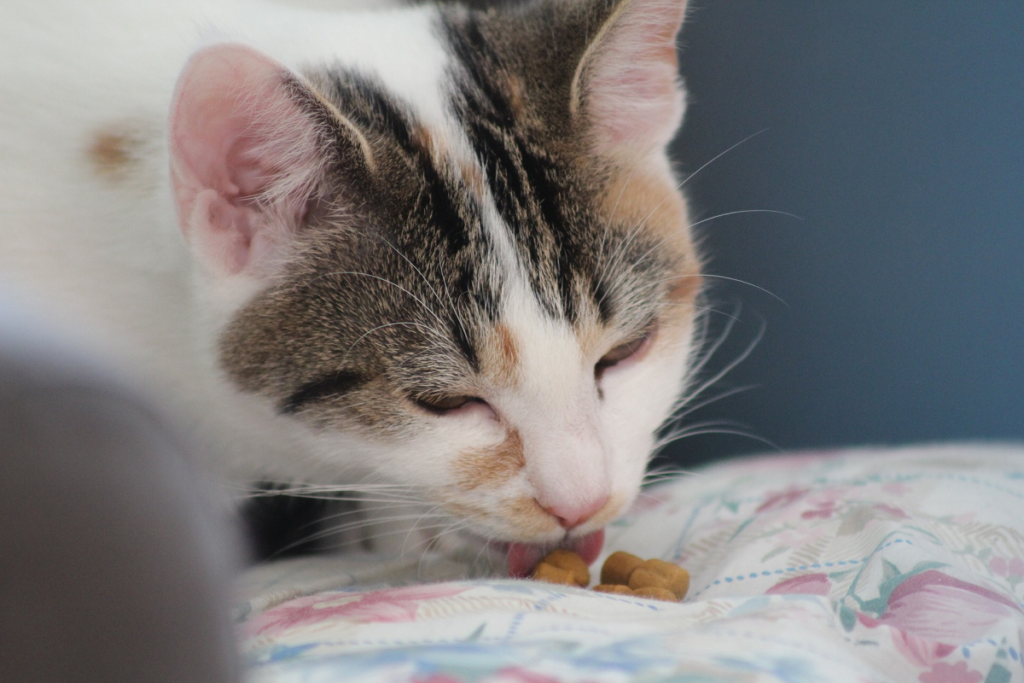Similar to prescription medications, when your cat is ill, he could be prescribed a food to treat his issues. These foods are designed to replace your cat’s prescription medication and can only be purchased with a veterinarian’s prescription. There is some debate over whether or not these prescription foods work as well as regular prescription medications but are still used in some scenarios.
These foods are scientifically formulated combinations of different meats, grains and medicines. Depending on which issue your cat has, the prescription will contain different ingredients. Only use prescription food on your cat for the recommended time and strictly the recommended amount or it could cause complications. According to Dogs Naturally Magazine, veterinarians place between 35% to 45% of their patients on prescription dog food. While no treatment program is foolproof, always be sure to do your research before giving anything to your beloved pet.
Over the Counter vs. Prescription Food
You may have noticed the food you buy your furry friend makes claims such as “heart healthy” or “good for digestion.” While these claims and formulas can potentially be good for your pet, they are much different from the prescription food your veterinarian would want you to buy. Over the counter foods make very general claims as to why they are good for your pet. The verbiage does not guarantee a result or a positive outcome in curing your pet. Much like human food and drugs and how the Food and Drugs Administration (FDA) monitors what people can consume, the Center for Veterinary Medicine (CVM), a branch of the FDA, monitors what goes into your pet’s food. Since all dog and cat food as relatively similar in formula, the CVM must track the differences in product closely. Each prescription food meets the specific dietary needs of each illness and include or exclude certain nutrients or chemicals needed for your pet to heal quickly and efficiently. Most major pet food brands also carry a prescription food brand as well.
What Illnesses Warrant Prescription Food?
Prescription food for your cat can be used for a variety of illnesses ranging in severity and length. These can be:
- Dental issues

- Heart disease
- Cancer
- Diabetes
- Bone density issues such as
- Skin issues (itching, dry skin, eczema)
- Weight management
- Post-surgery diets
- Serious or minor allergies
- Aging dogs and cats
- Liver or kidney failure/disease
- Gastrointestinal issues
Most Popular Diseases or Issues that Need Prescription Food
Kidney Disease: In felines and canines alike, prescription food can be used to combat kidney disease. In the case of kidney failure, the foods for this are low protein and low phosphorus in order to be easily digested. Reducing these specific nutrients can reduce the degenerative kidney failure process. This formula can also be beneficial for dogs with kidney stones. In certain cases, your veterinarian can prescribe this food for dealing with kidney stones, but this has not always been proved to make a difference.
Weight Loss/Diabetes: For dogs and cats with diabetes, prescription food can be used to aid in weight loss and regulate blood sugar levels. Historically, veterinarians had prescribed high fiber diets of any kind in order to slow digestion. This slow digestion helps to maintain blood sugar and glucose levels. The high fiber also contributes to weight loss because it lowers the total calorie content of the meal. Although now, some prescription foods for diabetes, in cats specifically, contain high protein and high fat. Recent studies have shown this diet may be more helpful in combating diabetes.
 Allergies: Prescription food is especially useful in the case of allergies because it removes all nutritional stressors from you cat’s food. After exposing your animal to a variety of nutrients over his lifetime, changing your pet’s food can be quite helpful. These prescription foods are generally bland and contain minimal nutrients outside of what your cat or dog needs to keep him healthy. This is generally used for skin issues in your animal. Changing his food to these hypoallergenic diets can reduce itchy, dry skin and alleviate your pet’s biting and scratching. In these diets, the inflammatory ingredients have been hydrolyzed and will not inflame the immune system.
Allergies: Prescription food is especially useful in the case of allergies because it removes all nutritional stressors from you cat’s food. After exposing your animal to a variety of nutrients over his lifetime, changing your pet’s food can be quite helpful. These prescription foods are generally bland and contain minimal nutrients outside of what your cat or dog needs to keep him healthy. This is generally used for skin issues in your animal. Changing his food to these hypoallergenic diets can reduce itchy, dry skin and alleviate your pet’s biting and scratching. In these diets, the inflammatory ingredients have been hydrolyzed and will not inflame the immune system.
Heart Health: Similar to humans, your pet can benefit from a heart healthy diet. When people look to improve their cardiac health, they lower their sodium intake and your pets are no different. While sodium is not the direct cause of heart disease, the restriction of sodium can assist in the maintaining of it and preventing hypotension. Some of these prescription foods also contain a multitude of fatty acids and other antioxidants that are good for heart health.
Oral Issues: The prescription foods for oral health claim to help remove tartar from your pet’s teeth. The buildup of tartar in your animal can cause serious health issues such as gum disease and if left untreated, tooth rot. These lead to expensive dental procedures, bad breath and a lot of uncomfortable moments for your dog or cat. These oral health prescription foods are said to produce less tartar when the pet eats. Other options would be purchasing the chews meant to remove tartar and improve the smell of your pet’s breath.
Inflammatory Bowel Disease can be caused by a variety of different reactions. It can be an allergic reaction to what he eats, a symptom of pancreatic or  stomach cancer or simply constipation. These gastrointestinal issues that include cat vomiting, diarrhea and discomfort can be relieved by changing the animal’s diet. There are two major forms used to help animals with these symptoms. In some formulas, they use low residue food which contain small levels of soluble fiber and a healthy amount of omega 3 and omega 6 fatty acids. This mixture is easily digestible and supposedly helps to aid IBD and GI issues. The other diet used to treat these issues can be high in fiber in order to slow the GI tract and slow down diarrhea. This is also useful if you are trying to manage the weight of your dog or cat.
stomach cancer or simply constipation. These gastrointestinal issues that include cat vomiting, diarrhea and discomfort can be relieved by changing the animal’s diet. There are two major forms used to help animals with these symptoms. In some formulas, they use low residue food which contain small levels of soluble fiber and a healthy amount of omega 3 and omega 6 fatty acids. This mixture is easily digestible and supposedly helps to aid IBD and GI issues. The other diet used to treat these issues can be high in fiber in order to slow the GI tract and slow down diarrhea. This is also useful if you are trying to manage the weight of your dog or cat.
Urinary Tract Issues: Urinary tract issues in your pet can range from bladder stones to a basic infection. In your animal, when he gets a bladder stone, it is composed of struvite or calcium oxalate. Your veterinarian can tell you exactly what they are composed of through a urinalysis. The diets used to combat this control struvite and modify the calcium oxalate in your pet. These diets would help to improve the health of the lower urinary tract.
Are there Alternatives?
There are a couple of different routes pet owners may take to avoid the costly method of prescription food. One way to avoid prescription food would be the raw food diet. This diet is made up of bland food such as chicken, rice or eggs (along with other bland diet ingredients). This diet is extremely easy for your pet to digest and still provides most of the nutrition your cat needs.
Another way would be to simply buy over the counter food that meets the nutrition requirements. While these foods are not guaranteed to fix your pet, some people feel as though they are just as result driven as the prescription food. These foods carry all the nutrients your cat or dog needs. Pet parents can also use CBD for cats to potentially reduce inflammation (joint pain, chronic pain) and anxiety. Always consult with your veterinarian before deciding on which plan of treatment is best for your cat.
Sources:
“Everything You Need To Know About Prescription Dog Food.” Dog Food Insider, 12 Jan. 2017, http://www.dogfoodinsider.com/everything-need-know-prescription-dog-food/
Leonardi, Lauren. “When Might I Need a Prescription Dog Food?” PetCareRx, Published by: PetCareRx, 29 Jan. 2014, www.petcarerx.com/article/when-might-i-need-a-prescription-dog-food/1631.
“Veterinarian-Prescribed Dog Foods.” Whole Dog Journal, 26 Apr. 2019, www.whole-dog-journal.com/food/veterinarian-prescribed-dog-foods/.




